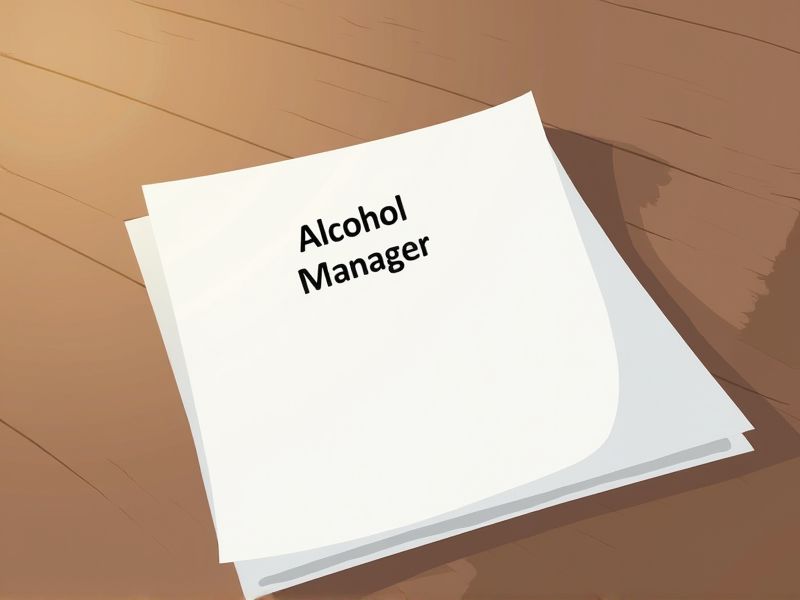
The role of an Alcohol Manager carries significant responsibility to ensure safe and legal alcohol service, requiring a deep understanding of relevant laws and regulations. Certifications provide validation of one's capability to manage alcohol-related risks and compliance effectively. These credentials support proper training in areas like responsible alcohol service, inventory control, and customer safety. Here are some important certifications you may need as an Alcohol Manager.
TIPS (Training for Intervention Procedures)
TIPS (Training for Intervention Procedures) is essential for Alcohol Managers to minimize legal liability by ensuring staff understand and comply with alcohol regulations. This training equips managers to effectively identify and manage intoxicated patrons, preventing potential incidents and enhancing guest safety. Knowledge from TIPS helps reduce alcohol-related risks by teaching management strategies to prevent over-service. Businesses with TIPS-certified managers often see a decrease in alcohol-related violations and insurance premiums, promoting a safer environment for both staff and customers.
ServSafe Alcohol Manager Certification
The ServSafe Alcohol Manager Certification ensures that alcohol managers understand responsible alcohol service, reducing the risk of underage drinking and overconsumption. Without proper certification, establishments may face legal liabilities and reputational damage due to improper alcohol management. The program equips managers with knowledge on recognizing signs of intoxication and effectively handling refusal of service situations. Many states and municipalities require such certification to comply with local liquor laws and maintain operating licenses.
Responsible Beverage Service (RBS) Certification
Responsible Beverage Service (RBS) Certification enhances an Alcohol Manager's ability to identify and prevent underage or excessive alcohol consumption. It equips them with the skills needed to handle difficult situations, reducing the potential for legal liabilities and financial penalties. The certification often leads to safer alcohol-serving environments, directly impacting community health and safety. Regulations increasingly mandate RBS Certification, meaning managers without it could face operational challenges or even closure.
Certified Alcohol Manager (CAM) Certification
Certified Alcohol Manager (CAM) Certification provides managers with thorough knowledge of alcohol laws and regulations, ensuring legal compliance in establishments. It equips managers with skills to handle alcohol responsibly, which reduces the risk of incidents related to intoxication or underage drinking. The certification enhances the credibility of the establishment, attracting customers who value a safe and responsible environment. Based on data, establishments with certified managers often report fewer liabilities and enhanced staff accountability.
State-Approved Alcohol Server Training Certification
State-Approved Alcohol Server Training Certification is needed for alcohol managers because it educates them on responsible serving practices, which reduces the risk of over-serving and underage drinking. By understanding state-specific laws and regulations, managers can ensure compliance and avoid legal penalties for their establishments. The training enhances their ability to manage challenging situations, such as handling intoxicated patrons, which contributes to a safer environment. Certification also boosts the establishment's credibility, signaling to patrons and authorities that responsible alcohol management is a priority.
Food Safety Manager Certification
Having a Food Safety Manager Certification ensures alcohol managers understand health regulations, which reduces risks of contamination when handling mixed beverages. Knowledge gained from certification helps managers comply with both food and safety inspections, which improves overall establishment standards. The certification enhances an alcohol manager's competence in preventing foodborne illnesses, which may arise from poor handling practices. With documented credentials, trust from regulatory bodies and consumers can increase, leading to sustained business success.
Certified Hospitality Supervisor (CHS)
The management of alcohol in hospitality settings necessitates expertise in compliance with legal regulations, which a Certified Hospitality Supervisor (CHS) provides. Proper alcohol management is crucial to maintaining guest safety and ensuring responsible service, a competency enhanced by CHS training. Establishments often see a reduction in liability risks when supervised by a certified professional skilled in handling alcohol-related situations. The CHS designation reflects a commitment to professionalism and ethical standards, fostering trust with clientele and stakeholders.
Mixology Certification
Obtaining a mixology certification equips an alcohol manager with comprehensive knowledge about various spirits, which enhances the quality of the drinks served. This certification also ensures familiarity with responsible serving practices, reducing legal liabilities and promoting customer safety. Knowledge gained from mixology certification can lead to more creative and appealing drink menus, directly improving customer satisfaction and business profitability. Training in mixology provides managers with leadership skills necessary to effectively train and support bartending staff, improving overall service efficiency.
Certified Sommelier
A Certified Sommelier offers in-depth wine knowledge that enhances a restaurant's or hotel's beverage program. This expertise leads to increased customer satisfaction and potentially higher sales, as guests often trust recommendations from trained professionals. The presence of a sommelier can also elevate a venue's reputation, attracting wine enthusiasts and connoisseurs. Their ability to train staff on wine service and pairings ensures consistent and high-quality customer experiences.
Workplace Alcohol Awareness Certification
Workplace Alcohol Awareness Certification equips alcohol managers with the knowledge to handle alcohol-related incidents effectively, reducing risks in establishments that serve alcohol. Training helps managers comply with legal regulations, minimizing liability and potential fines for the business. Certification instills a culture of responsibility, ensuring staff understand the implications of over-serving and preventing alcohol abuse. Enhanced understanding of alcohol's effects promotes safer environments, safeguarding patrons and improving overall customer experience.
Summary
When you, as an Alcohol Manager, obtain certifications, it elevates your expertise and credibility in the industry. Employers recognize your commitment to professional development, which enhances job security and may lead to career advancement opportunities. Certifications equip you with advanced knowledge of regulations and safety, reducing the risk of compliance violations. With these credentials, you can contribute more effectively to your organization's success and customer safety, earning trust and respect.
